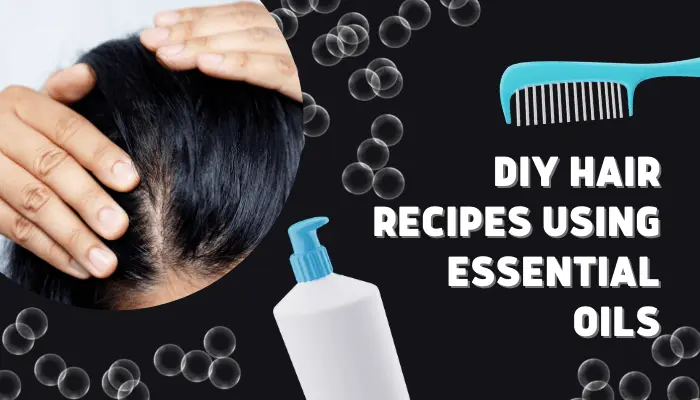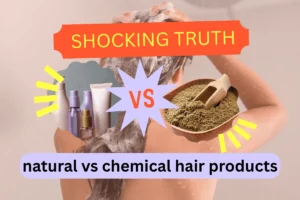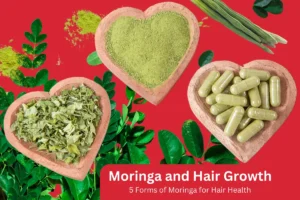Explore an in-depth outline for crafting your own natural hair care solutions using essential oils. Discover detailed sections covering benefits, safety measures, popular oils, DIY recipes, and more for a holistic approach to vibrant, healthy hair.
Table of Contents
Introduction:
Homemade mixtures with essential oils have become a game-changer in the hair care industry, opening doors to a plethora of natural solutions for luscious locks. Explore the amazing advantages, safety precautions, and wonderful recipes of this all-natural hair care method that can provide salon-quality results right to your door.
Benefits of Essential Oils for Hair:
Improving Hair Health:
Essential oils offer a holistic solution to common hair issues. They penetrate the hair shaft, providing nourishment from within. DIY hair Recipes Using Essential Oils stimulate hair growth, balance oil production, and alleviate dryness, leaving hair healthier and more manageable.
Natural Fragrance Boost:
Apart from their therapeutic benefits, essential oils bring delightful natural fragrances. These scents linger, providing a subtle yet enchanting aroma that uplifts spirits and elevates the hair-washing experience.
Ensuring Safe Beauty: Essential Safety Measures for DIY Hair Recipes Using Essential Oils:
Patch Testing:
Before diving into full-scale use, it’s crucial to conduct patch tests. Apply a small amount of diluted oil to your skin to ensure no allergic reactions or irritations occur.
Dilution Guidelines:
Essential oils are potent and must be diluted with carrier oils or other mediums to ensure safe application.
When using essential oils, it’s crucial to follow proper dilution ratios to ensure safety and prevent adverse reactions. The recommended dilution ratio for essential oils is generally around 2% for adults, which means adding approximately 12 drops of essential oil per ounce (30 ml) of carrier oil. This ratio helps mitigate the risk of skin irritation or sensitization. Reference: Tisserand, R., & Young, R. (2014). Essential Oil Safety: A Guide for Health Care Professionals (2nd ed.). Churchill Livingstone.

DIY Hair Recipes Using Essential Oils and Exploring Popular Essential Oils for Hair Health:
1. Rosemary Oil
Rosemary oil, well known for its stimulating qualities, improves blood flow to the scalp, encouraging the growth and thickness of hair. Its anti-inflammatory properties relieve scalp irritation and help avoid dandruff and other scalp problems.
Rosemary and Coconut Oil Scalp Massage
Ingredients:
- 2 tablespoons of coconut oil
- 4-5 drops of rosemary oil
Directions:
- Mix the coconut oil and rosemary oil in a bowl.
- Massage the mixture onto your scalp using circular motions.
- Leave it on for 30 minutes or overnight for better absorption.
- Wash your hair thoroughly.
This scalp massage not only promotes hair growth but also nourishes the scalp, leaving your hair feeling rejuvenated.
2. Lavender Oil
Lavender oil’s soothing aroma not only eases mental tension but also feeds hair follicles. It helps to promote hair development, lessen inflammation on the scalp, and balance the production of natural oils in the body.
Lavender and Jojoba Oil Hair Serum
Ingredients:
- 1 tablespoon of jojoba oil
- 5-6 drops of lavender oil
Directions:
- Combine the jojoba oil and lavender oil in a small container.
- Apply a few drops of this serum to your scalp and hair ends.
- Gently massage it into your scalp and leave it overnight.
- Wash your hair in the morning.
This serum not only encourages hair growth but also imparts a delightful fragrance to your hair.
3. Peppermint Oil
Peppermint oil’s cooling effect energizes the scalp, boosting hair follicles and encouraging the growth of thicker hair. It works especially well to relieve dryness and itching.
Peppermint and Olive Oil Hair Mask
Ingredients:
- 2 tablespoons of olive oil
- 3-4 drops of peppermint oil
Directions:
- Mix the olive oil and peppermint oil thoroughly.
- Apply the mixture to your hair and scalp, focusing on the roots.
- Wrap your hair in a towel or shower cap for 20-30 minutes.
- Rinse it out with shampoo and cold water.
This invigorating hair mask stimulates hair follicles, promoting healthy hair growth and a refreshed scalp.
4. Hibiscus Oil
This oil, which is extracted from hibiscus flowers, has a plethora of hair-nourishing qualities. Hibiscus oil, which is high in amino acids, vitamins A, C, and other nutrients, fortifies hair follicles, reducing hair loss and encouraging the growth of thick, healthy hair. Because of its moisturizing qualities, dryness is also avoided, guaranteeing a healthy scalp.
Hibiscus and Coconut Oil Infusion
Ingredients:
- 1 cup of coconut oil
- Handful of dried hibiscus flowers
Directions:
- Heat the coconut oil in a pan and add the dried hibiscus flowers.
- Let it simmer on low heat for 15-20 minutes.
- Allow the mixture to cool and strain out the hibiscus flowers.
- Store the infused oil in a glass container and apply it as a hair mask or scalp treatment.
This infusion harnesses the nourishing properties of hibiscus, enriching the coconut oil with vitamins and nutrients for stronger, thicker hair.
5. Onion Oil
Onion oil changes the game when it comes to hair treatment, even with its strong scent. Tightened hair, stimulated hair follicles for better growth, and increased production of collagen are all benefits of its Sulphur content. Because of its antibacterial qualities, it also fights dandruff and scalp infections, which promotes thicker hair.
Onion and Castor Oil Hair Potion
Ingredients:
- 2 tablespoons of onion oil
- 1 tablespoon of castor oil
Directions:
- Mix the onion oil and castor oil in a small bowl.
- Apply the blend to your scalp and hair, massaging gently.
- Leave it on for at least an hour or overnight.
- Rinse thoroughly with a mild shampoo.
This potent potion combining onion and castor oil strengthens hair strands, promoting thickness and vitality.
6. Neem Oil
The neem tree yields neem oil, which has strong antibacterial, antifungal, and anti-inflammatory qualities. It works very well for problems of the scalp like dandruff and itching. Neem oil supports thicker, more vigorous hair development by maintaining a clean, healthy scalp.
Neem and Almond Oil Scalp Soothing Blend
Ingredients:
- 3-4 tablespoons of neem oil
- 2 tablespoons of almond oil
Directions:
- Combine the neem oil and almond oil in a container.
- Apply the mixture to your scalp, focusing on problematic areas.
- Leave it on for 30-40 minutes before washing your hair.
This soothing blend calms the scalp, alleviating irritation while supporting healthy hair growth.
Tips for Using Hibiscus, Onion, and Neem Oils
- For onion oil, the strong scent can be reduced by mixing it with other carrier oils or essential oils like lavender or rosemary.
- Hibiscus oil can stain, so be cautious with clothing and towels.
- Neem oil’s strong aroma can be tempered by adding a few drops of citrus essential oils like lemon or orange.
7. Jojoba Oil
Similar in composition to the natural oils produced by the scalp, jojoba oil regulates sebum production, making it a versatile oil for maintaining scalp health. It aids in unclogging hair follicles, promoting thicker hair growth.
8. Avocado Oil
Loaded with essential fatty acids, vitamins, and minerals, avocado oil deeply moisturizes the scalp and hair strands. Its nutrients strengthen hair roots, preventing breakage and supporting thicker hair growth.
Jojoba and Avocado Oil Scalp Massage
Ingredients:
- 2 tablespoons of jojoba oil
- 2 tablespoons of avocado oil
Directions:
- Combine the oils in a bowl.
- Massage the blend into your scalp using circular motions.
- Leave it on for 20-30 minutes before washing your hair.
This massage nourishes the scalp, promotes circulation, and strengthens hair for enhanced thickness.
9. Castor Oil
Castor oil, renowned for its rich consistency and potent nourishing properties, is a go-to solution for hair growth. Packed with omega-6 fatty acids and ricin oleic acid, it strengthens hair roots, minimizes hair fall, and fosters thicker hair growth.
Castor Oil and Rosemary Infused Serum
Ingredients:
- 2 tablespoons of castor oil
- 5-6 drops of rosemary essential oil
Directions:
- Combine the castor oil and rosemary essential oil in a bottle.
- Apply a few drops to your scalp and massage gently.
- Leave it on overnight for deep penetration and wash in the morning.
This serum boosts circulation and nourishes hair follicles, aiding in thickening hair strands.
10. Tea Tree Oil
Tea tree oil, which has antibacterial and antifungal qualities, is great for keeping the scalp clean and healthy. It promotes healthier hair development by clearing blockages in hair follicles.
Tea Tree Oil and Coconut Oil Scalp Soothing Treatment
Ingredients:
- 2 tablespoons of coconut oil
- 5-7 drops of tea tree oil
Directions:
- In a small bowl, mix the coconut oil and tea tree oil thoroughly until well combined.
- Part your hair and apply the mixture directly to your scalp. Gently massage it in using your fingertips for a few minutes to ensure even distribution and absorption.
- Leave the treatment on for about 30 minutes to allow the oils to penetrate the scalp and work their magic.
- After the waiting period, rinse your hair thoroughly with lukewarm water. Follow up with your regular shampoo and conditioner routine.
- For best results, use this treatment once or twice a week, depending on your scalp’s needs.
Precautions and Tips
- Always perform a patch test before applying any essential oil directly to your scalp to check for allergies or sensitivity.
- Dilute essential oils with carrier oils like coconut, jojoba, or olive oil to prevent skin irritation.
- Use essential oils in moderation; a little goes a long way.
- Ensure the hair is thoroughly rinsed after using masks or conditioners to prevent residue buildup.
Conclusion:
The potency of DIY Hair Recipes Using Essential Oils is unparalleled in the field of hair care. These organic mixtures provide a comprehensive, chemical-free method of reviving and nourishing your hair. Accept these recipes as your go-to method and use the power of essential oils to bring out your hair’s inherent beauty.
(FAQs) : DIY Hair Recipes Using Essential Oils
1. Are essential oils safe for hair?
Answer: Yes, when used properly and in diluted form, essential oils can be safe for hair. However, it’s essential to perform a patch test and properly dilute them with carrier oils to avoid skin irritation.
2. Which essential oils are best for hair growth?
Answer: Some popular essential oils for promoting hair growth include rosemary, peppermint, lavender, and cedarwood. These oils are believed to stimulate hair follicles and encourage healthier hair growth.
3. How can I use essential oils for dandruff?
Answer: Tea tree oil, rosemary, and peppermint essential oils are known for their antimicrobial properties, making them effective against dandruff. You can mix a few drops of these oils with a carrier oil and massage the blend onto your scalp.
4. Can essential oils help with dry or damaged hair?
Answer: Yes, certain essential oils like lavender, rosemary, and geranium can help hydrate and repair dry or damaged hair when used in hair masks or serums. They possess properties that can improve hair texture and manageability.
5. What are the benefits of using DIY hair recipes with essential oils?
Answer: DIY hair recipes using essential oils offer numerous benefits, including nourishing and moisturizing the hair, promoting scalp health, reducing dandruff, adding shine, and even stimulating hair growth, depending on the oils used.







